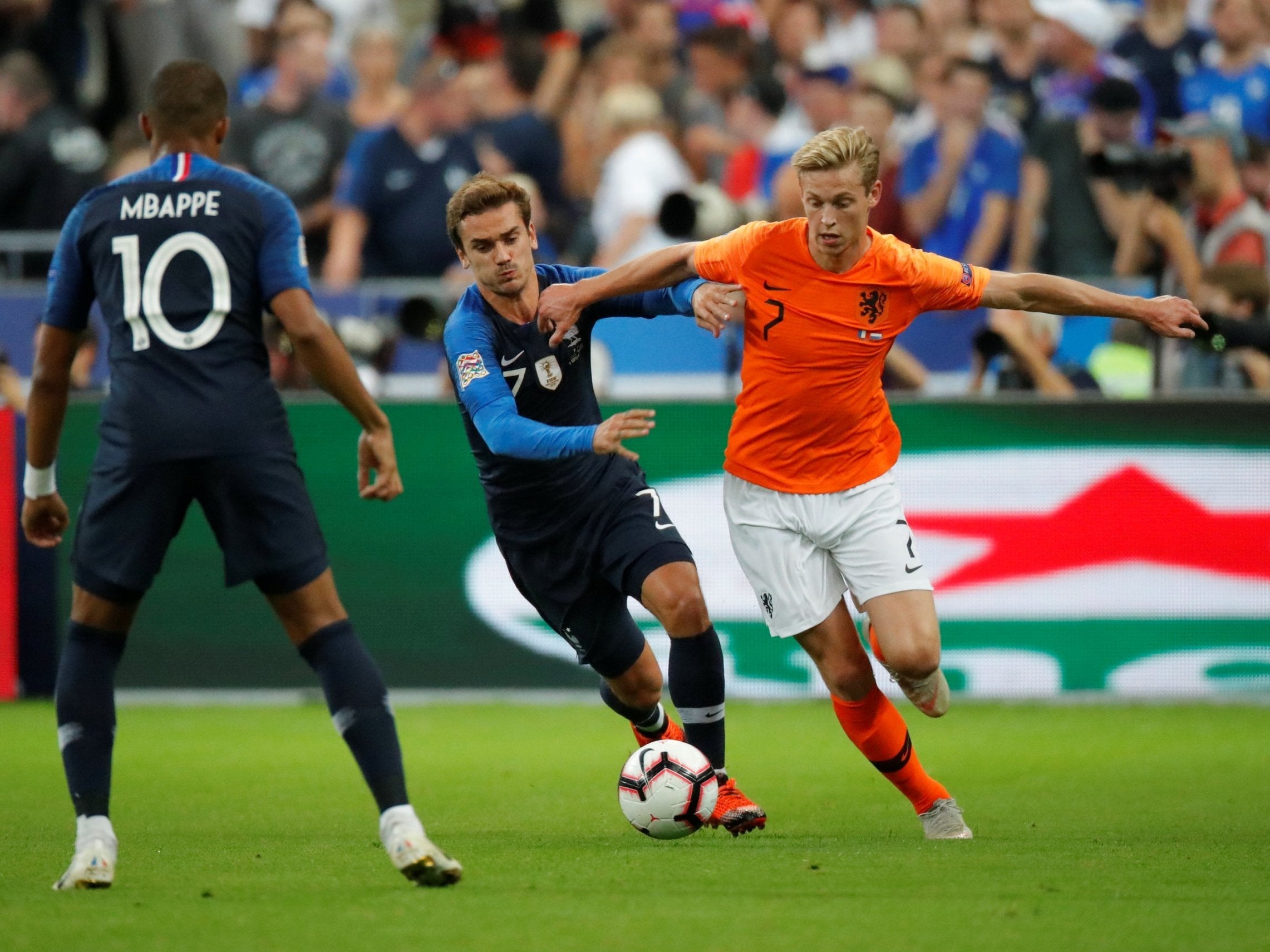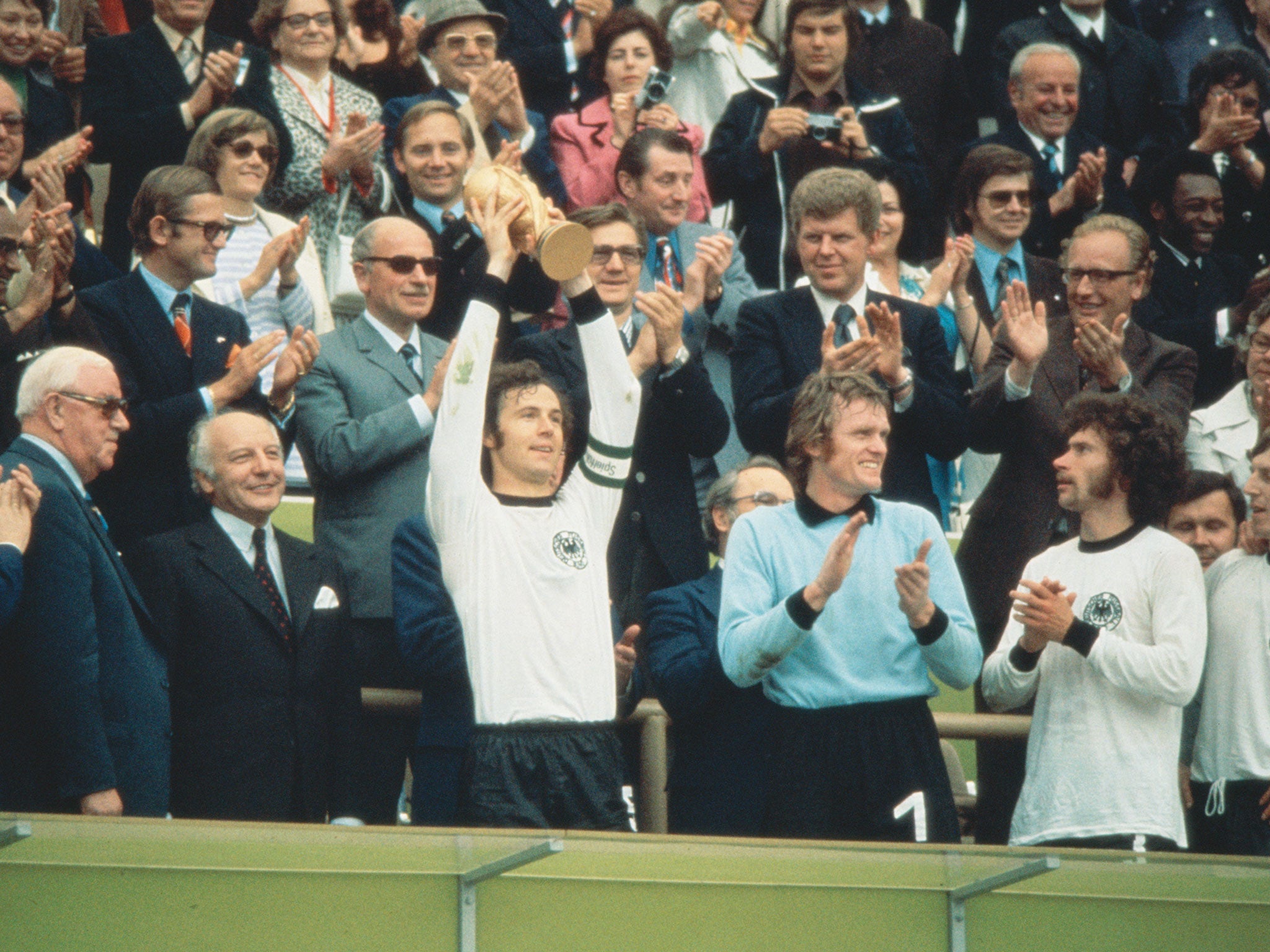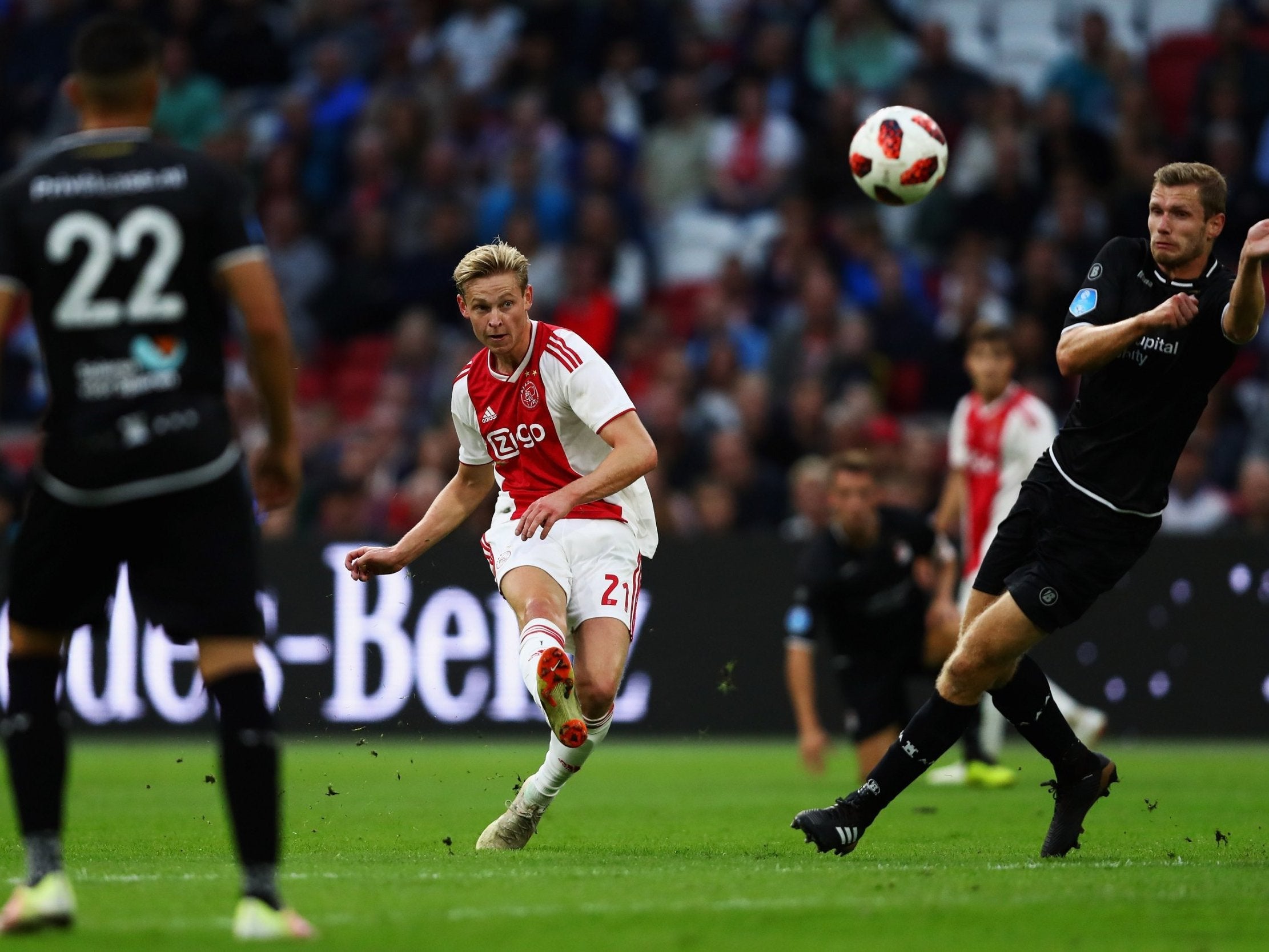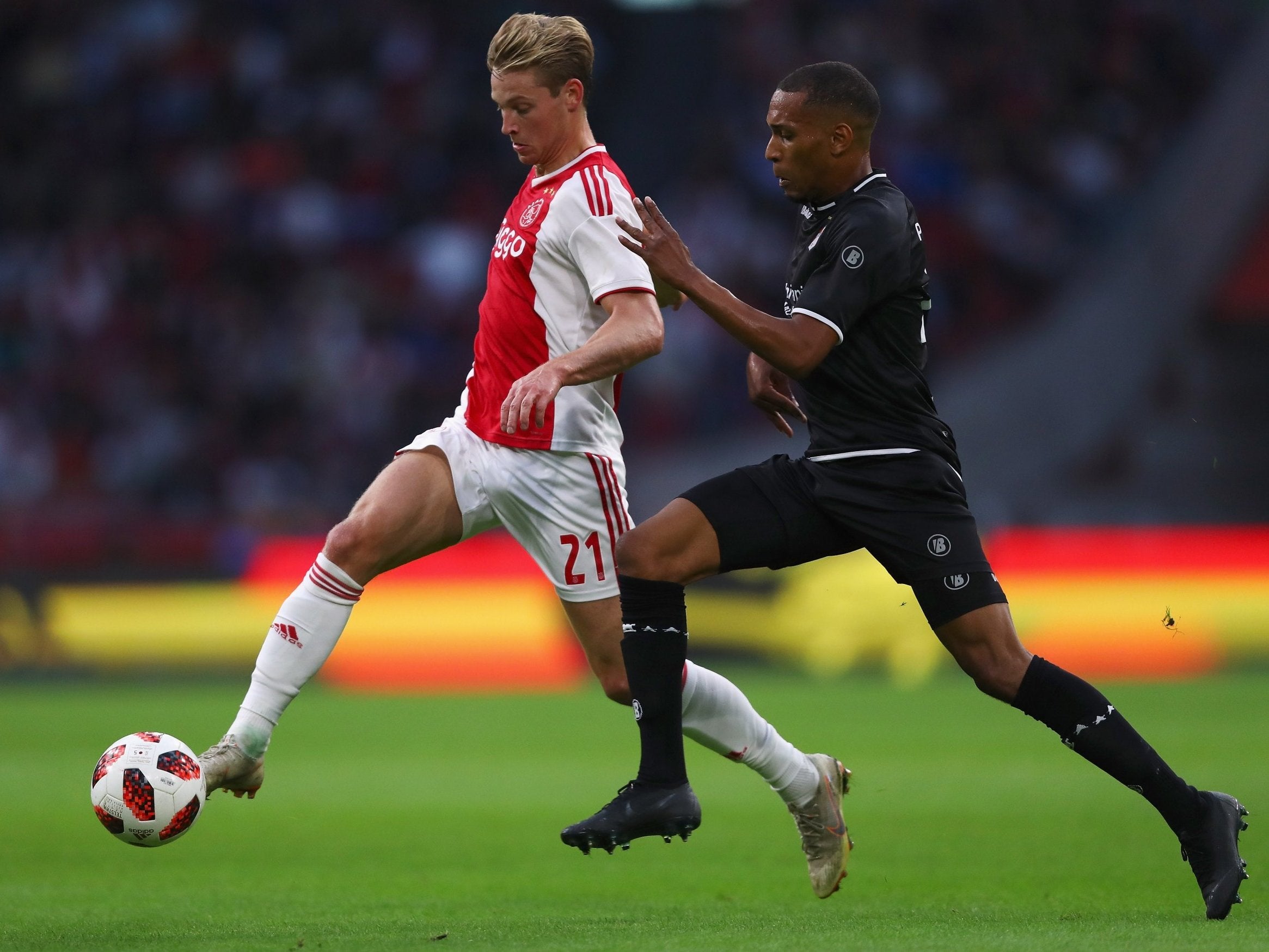Frenkie de Jong is the latest dirty football crush, indicative of an age where ‘clean’ judgements on players are no longer possible
A talented player unlike those who have gone before, De Jong might be the best thing since sliced bread – but it won't be you who gets to make an objective, untainted judgement on that

The pace. The power. The vision. The balls. The lightness of touch and the quickness of feet. Watching Frenkie de Jong is like an out-of-body experience, a wormhole into the future, a lightning bolt of omniscience that allows us - for just a split second - to see with perfect clarity. As he lays tired midfields to waste, as he stirs oppositions into a blind panic, you’re overcome with a single, piercing thought: nothing will ever be the same again. I have glimpsed the next hundred years of football, and before long the sport as we know it will divide neatly into two ages: before Frenkie de Jong, and after.
I’m sorry.
I just can’t do this.
I can’t lie to you any longer.

I’m coming clean: I’ve never actually seen Frenkie de Jong play. I know he’s a midfielder who plays for Ajax. I know Barcelona and Tottenham are supposed to be interested in him. And I know he’s a bit of a big deal, because after researching him on the internet for an hour, Google’s algorithm is now trying to sell me Ajax centre-halves. (“Quick! Last Few Left!”)
But to be perfectly honest, I’ve never even come close to seeing Frenkie de Jong play. I don’t even know what channel has the rights to the Eredivisie. Presumably it’s one of those new upstart subscription services where you pay £7.99 a month for exclusive coverage of the Eredivisie, the Swedish Allsvenskan, US college golf, one of the less-well regulated fight sports and as much monster truck action as you can cram through your broadband connection. Which needless to say, I won’t be doing, as I always forget to cancel these things after the one-month free trial, and besides £8 a month is lot of money just to be able to tell people you've seen Frenkie de Jong.
Because as any fool knows, you don’t actually need to watch Frenkie de Jong playing football to form an opinion on him. Or at least, you don’t need to watch very much at all. One of those little 90-second highlights clips they put on Twitter will suffice. Or, if you’re going to push the boat out, you can skim through one of those YouTube tactics videos compiled by someone with enough dedication to sift through and edit hours of Ajax footage and put smart little yellow arrows all over it, but who still hasn’t worked out that not everyone wants their football highlights soundtracked by DJ Tiesto at ear-splitting volume. With just the above material to hand, you are now fully qualified to say whatever you want about Frenkie de Jong, under a clause of internet discourse known as the ‘Naby Keita’ rule.
But let’s start right at the beginning. De Jong is 21 years old, and to describe him as a phantom of the internet’s collective imagination is to do a disservice to his fresh and exceptionally exciting talent. He was called up to the Dutch national squad by Ronald Koeman for the first time this month, impressing on his competitive debut against France to the extent that Kylian Mbappe tracked him down after the game to ask for his shirt. And for a country undergoing perhaps its gravest footballing slump for half a century, de Jong offers fresh hope: an old-style sweeper with the poise and balance of Gullit, the vision and intelligence of Rijkaard, the pace and directness of Robben.

Unlike many products of the famous Ajax dream factory, de Jong didn’t come through the academy from childhood, but was snapped up from Willem II after sporting director Marc Overmars saw him in a youth team game. And though he is a midfielder by disposition, this season coach Erik ten Hag has intuitively deployed him at the heart of defence, from where his ability to spot a gap, break the initial press and surge 60 yards up the pitch unchallenged has put him on the radar of some of Europe’s top clubs, including of course Tottenham, who as a result of a UEFA by-law are contractually obliged to buy one Ajax centre-half a season.
Is he worth the hype? I don’t know, and to be brutally frank, neither does anyone: not yet. There are those who see de Jong as part of a new vanguard of modern centre-halves who are not just a springboard for attacks, but attackers in their own right. Virgil van Dijk, Jan Vertonghen and John Stones spring to mind from the Premier League, along with the likes of Jean-Philippe Gbamin at Mainz or Jeremiah St Juste at Feyenoord. Equally, it’s all very well having a defender who can run like Gareth Bale, but… well, can they actually defend? On this, and a hundred other relevant points, the jury remains resolutely out.

As it happens, I’m less concerned about the actual footballing merits of de Jong, and more what he represents: what his tale says about a game so preternaturally sensitive to novelty and desperate to anoint the next big thing that a player who looks even vaguely different will be feted with the enthusiasm of a second coming. Or, put more simply: exactly when is the appropriate time to get excited about a player?
A generation or two ago, it was a simpler question to answer. The first time you saw a player was the first time you saw them. You can well imagine the consternation a talent like de Jong would have created had he pitched up unannounced at Wembley in about 1960: pipes falling from mouths all along the press box, thousands of screaming teenage girls clustering around the Dutch dressing room at full-time, a lively debate in the Times letters page as to whether dribbling the ball out of defence, while very impressive, is strictly within the spirit of the game. All too readily these days, laments for the modern game lapse into a sort of empty nostalgia. But on the death of mystery, the evaporation of collective discovery, the dilution of football’s pure shock value, they may have a point.

Perhaps it’s time to admit that nobody ever really watches a player “clean” any more. From the very first moment they pass before our eyes - and sometimes, even earlier - our judgement has already been refracted through the judgements of others, all the words that have been written about them, all the fire emojis we have seen alongside their name, the addictive impulse in all of us to be able to say we saw him first. By the time a player like de Jong emerges into the light, they have long since been stripped of their right to a blank slate. The first time we watch de Jong over 90 minutes, we’ll already be watching him through a preconceived lens of the hype machine, to say nothing of snarky weekend columns commenting archly on the hype machine while also sharing in its lustre. Guilty as charged, by the way.
And yet. Strip all this away for a moment, load up all the requisite caveats, acknowledge the manifold limitations of the short-form video, and the feelings are still real. The excitement is still real. How is it possible to get this animated about a player you’ve never seen? I don’t know, but all the same, it is. Perhaps the real joy of football is that it allows us to imagine the world not as it is, but as it might be. I’m aware that Frenkie de Jong may not be all he’s cracked up to be. I’m aware that a four-minute video is no basis for rational judgement. I’m aware that half the world’s ills stem from people seeing things that aren’t there, asserting things they can’t possibly know for sure. But god, I still want to believe.
Join our commenting forum
Join thought-provoking conversations, follow other Independent readers and see their replies
Comments
Bookmark popover
Removed from bookmarks